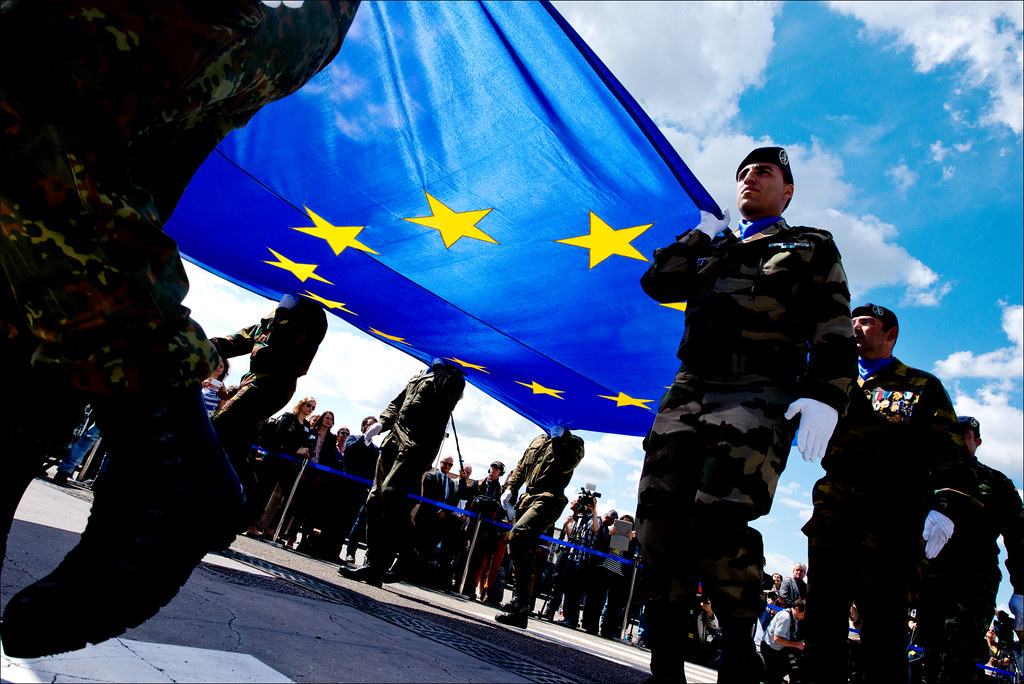A year after Emmanuel Macron proclaimed NATO was ‘brain dead’, recent significant developments in EU defence cooperation raise the question of whether an EU army is on the cards in the foreseeable future.
Since its origins, European integration has been geared towards an ‘ever-closer union’. A joint military seemingly appears as the next step in further integration. A combined defence force would include the pooling of member state armies, called on to assist any nation in the union or intervene in third countries. However, the subject remains controversial for member states and their citizens. 21 EU member states are already members of the North Atlantic Treaty Organisation (NATO), which provides for the coordination of joint military and crisis response capabilities under US leadership. An additional military coalition would duplicate and possibly jeopardise this relationship.
The Brain Death of NATO
Although NATO and the EU share a joint declaration that highlights the importance of their partnership, in 2019, French President Emmanuel Macron stated that ‘we are currently undergoing the brain death of NATO‘ and Europe should no longer be reliant on the organisation. The EU faces various potential security threats, including from Russia and China, in the foreseeable future, and due to the current lack of strategic coordination between the United States and European partners, NATO is unlikely to be ready to combat these new challenges. This breakdown in trust followed accusations from former US President Donald Trump, who accused European NATO members of not meeting their military expenditure quotas and for relying too much on the US for their defence. Trump additionally called the Atlantic alliance ‘obsolete‘ and reportedly suggested withdrawing the US. In response, Macron has claimed that Europe should think as a geopolitical power and become strategically independent from Washington.
However, not all of Europe agrees that NATO is dying. German chancellor Angela Merkel disagreed with Macron, claiming that NATO is in Europe’s interest now more than ever despite previously favouring the development of a joint EU military force. In response to such criticisms, NATO released a new report in December 2020, ‘NATO 2030’, which outlines a series of recommendations to boost NATO’s political cohesion and ability to face new security challenges, suggesting that the alliance is not brain dead but carefully planning for the future. Sweden’s Parliament recently voted in favour of the NATO option, which permits the country to join the alliance in the future, suggesting that the alliance is still appealing and perhaps not in need of a replacement.
EU Defence Projects
The EU Parliament stresses that the EU has no plans to develop an EU army, claiming it a ‘myth’ as defence is exclusively an issue for member states. Nevertheless, the union has taken significant steps to boost defence cooperation. In 2017, PESCO (Permanent Structured Cooperation) launched, which involves the permanent pooling of resources through a series of projects to enhance the EU’s capacity as an international security actor. Additionally, the European Defence Fund (EDF) was launched in 2017 to complement national investments and provide both practical and financial incentives for collaborative research, development, and defence equipment and technology acquisition. Both initiatives suggest the emergence of a framework on which an EU army could potentially be built off.
The recent and controversial development of the European Peace Facility in which the EU agreed to send military aid and equipment to foreign conflicts indicates a push to increase the EU’s influence in international conflicts and military status. The proposed €5 billion budget is significant as current guidelines constrain the EU from funding military procedures and providing lethal weaponry, yet the EPF would evade these rules due to its ‘off-budget’ construction. The military equipment will be sponsored with proper training, safety controls and risk assessments, aiding foreign militaries to carry out peace enforcement activities for themselves. However, the project faces significant backlash as NGOs argue it is a façade for funding futile and practically harmful EU activities worldwide. For instance, Simon Coveney, Ireland’s defence minister, has said the country would oppose any EU initiative that supplies outside countries with lethal weapons that may fuel potential war and rights abuses worldwide. Instead, Ireland aims to ensure that similar neutral countries that do not want to be involved in funding the provision of arms are not compelled to do so.
Why an EU army is unlikely
The adoption of France and Germany’s preliminary treaty, which aims to build a “common military culture” this January, suggests the initiative of a single European military force is in motion, yet the likelihood of such a force developing in the future is doubtful and faces many obstacles. For instance, it would involve EU treaty changes, which all governments and legislatures must approve in the 28 countries, and possibly have to attain approval from at least a handful of public referendums that may involve many compromises to the original initiative. Member states such as the Netherlands, Poland, Latvia and Lithuania have previously stated that they do not see any need to duplicate what NATO is doing. There are also practical issues, as all EU nations must agree simultaneously on military decisions such as going to war, which is often impossible in situations requiring responsive policymaking.
Yet, a united European defence force may be beneficial for the bloc as individual European defence spending is often ‘fragmented, wasteful and redundant’ as most European states face a compromise in the allocation of their funds between acquiring new technology and maintaining their current forces, often neglecting research and development. A joint army would involve states sharing soldiers, equipment, and resources, meaning members would save funds that can be utilised to develop other infrastructure and institutions. Additionally, the EU would have a more significant presence on the international stage, becoming an important player no longer marginalised but involved in international security matters.
Overall, the EU is taking steps in the right direction by developing its defence cooperation between member states to become less dependent on the US and build its image as a prominent global actor. However, the union’s original purpose and what member states have agreed to was and remains an economic alliance. Further integration is quickly removing individual nations’ sovereignty. An EU army may be a step too far.
Kimberley Burton (she/her) is a UEA International Relations student who wrote this piece as part of her second-year module ‘Introduction to the European Union’ organised by Pierre Bocquillon.





